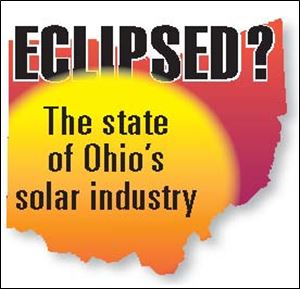
Pro-solar bills on horizon
3/10/2010
In coming weeks, bills will be up for a vote in both chambers of the Ohio General Assembly to eliminate a tangible personal property tax on solar companies.
And in May, voters will decide whether to extend the Ohio Third Frontier program, a bond package that funds high-tech ventures and has contributed about $40 million to northwest Ohio projects since 2003.
But will those votes - in the General Assembly and at the polls - be enough to strengthen Ohio's global position in the solar industry in 2010?
Yesterday The Blade published its final installment in a three-day series that showed Toledo and other Ohio cities had lost out on solar manufacturing jobs for the last decade because of a failure by state officials to attract companies with tax incentives or create a viable market for solar panels.
Since 2007 alone, the year Newsweek magazine dubbed Toledo a solar "hot spot," thousands of those jobs have gone to states where companies were enticed by a mixture of tax credits, grants, and other incentives.
State leaders contacted by The Blade yesterday all said the removal of the property tax on solar companies and the renewal of Ohio's Third Frontier effort are crucial for economic development progress this year.
But some also said there was more state officials could do to boost Ohio's solar economy.
"We certainly need to do more," said Rep. Matt Szollosi (D., Oregon), the second-highest ranking member of the Ohio House. "These are the jobs of the future, and there are things the legislature can do to help."
Mr. Szollosi said a first order of business in the House should be to pass a bill that would eliminate the tangible personal property tax on solar manufacturing companies, and instead charge a flat fee of $7,000 per megawatt capacity.
The House bill is still in its drafting stages, but Mr. Szollosi said it would be co-sponsored by a Democrat (Roland Winburn, Dayton) and a Republican (Cliff Hite, Findlay).
Gov. Ted Strickland called for the utilities property tax to be eliminated in his State of the State address in January, and a similar bill has since been introduced in the Senate by state Sen. Chris Widener (R., Springfield).
Rep. Mark Wagoner (R., Ottawa Hills) said he supports Mr. Widener's bill and will campaign for the renewal of the Third Frontier program, but said Ohio also needs to "think outside the box" to make the state as competitive as possible.
"You can give all the lip service you want to creating solar jobs," Mr. Wagoner said. "The time for action is now, and the proof will be in the pudding."
Mr. Wagoner called on the Strickland administration to be more open to "game-changing investments," such as the rejected proposal offered by local solar company executive Norm Johnston to cover 30 former industrial sites with solar panels, using state funding.
State Senate President Bill Harris (R., Ashland) said the state needs "to do a better job of telling Ohio's story," citing the state's capable work force, manufacturing history, and university research.
Mr. Harris also mentioned policy successes like the phasing out of the corporate franchise tax, the state's renewable energy standards established in 2008, and industry support efforts such as the Third Frontier Program.
"It would [also] be good to look at the potential for other incentives that could increase our competitive standing with other states for attracting renewable energy jobs in the future," Mr. Harris said.
Ohio does not offer tax credits specifically for solar manufacturers like those in Oregon, Michigan, and elsewhere. And no state supports the solar industry quite like California, which has a $3.2 billion incentives program to blanket the state with solar-generated electricity.
Rob Nichols, spokesman for Republican gubernatorial candidate John Kasich, said that until state leaders "rethink everything and more effectively help businesses succeed, Ohio will continue to foolishly and needlessly suffer as we lose out on valuable jobs to our more economically competitive neighbors."
Amanda Wurst, Governor Strickland's spokesman, countered that while other states may offer "eye-popping" tax credits, Ohio "offers eye-popping tax cuts."
"Ohio has the lowest business taxes in the Midwest while many other states tax businesses in ways Ohio no longer does," she said.
"And that, along with the governor's call to eliminate the [tangible personal property] tax on solar companies … is a sure-fire way to fight the perception that Ohio is a tough state to do business in the solar industry."
Contact Joe Vardon at:
jvardon@theblade.com
or 419-724-6559.